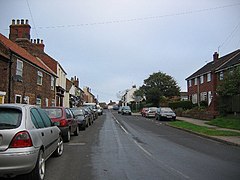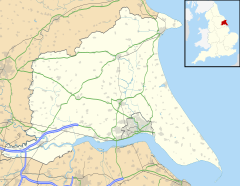world.wikisort.org - United_Kingdom
Roos is a village and civil parish in the East Riding of Yorkshire, England. It is situated 12 miles (19 km) east from Kingston upon Hull city centre and 3.5 miles (6 km) north-west from Withernsea, and on the B1242 road.
| Roos | |
|---|---|
| Village and civil parish | |
 Roos village, Main Street (B1242) | |
 Roos Location within the East Riding of Yorkshire | |
| Population | 1,168 (2011 census)[1] |
| OS grid reference | TA290303 |
| • London | 155 mi (249 km) S |
| Civil parish |
|
| Unitary authority | |
| Ceremonial county | |
| Region | |
| Country | England |
| Sovereign state | United Kingdom |
| Post town | HULL |
| Postcode district | HU12 |
| Dialling code | 01964 |
| Police | Humberside |
| Fire | Humberside |
| Ambulance | Yorkshire |
| UK Parliament | |
History
The de Ros family originated from the village of Roos.[2] Robert de Ros (died 1227) was one of the twenty-five barons appointed under clause 61 of the 1215 Magna Carta agreement to monitor its observance by King John of England.[3]
Geography

The civil parish is formed by the villages of Roos, Hilston and Tunstall, together with the hamlet of Owstwick.[4] According to the 2011 UK census, Roos parish had a population of 1,168,[1] an increase on the 2001 UK census figure of 1,113.[5] The parish covers an area of 2,333.222 hectares (5,765.52 acres).[6]
The Prime Meridian crosses the coast to the east of Roos.
The parish church of All Saints is a Grade I listed building.[7]
Governance
Roos is represented locally by Roos Parish Council[8] while at county level is in the South East Holderness ward of the East Riding of Yorkshire Council.[9] At a parliamentary level it is part of the Beverley and Holderness constituency which is represented by Graham Stuart of the Conservative Party.
In popular culture
The meeting of Beren and Luthien in J. R. R. Tolkien's The Silmarillion and The Lord of the Rings, was written after the author and his wife visited a wood near to Roos. The "hemlocks"[10] in the wood were said to have inspired his verse.[11]
References
- UK Census (2011). "Local Area Report – Roos Parish (1170211247)". Nomis. Office for National Statistics. Retrieved 24 February 2018.
- GENUKI. "Genuki: ROOS: Geographical and Historical information from the year 1892., Yorkshire (East Riding)". www.genuki.org.uk. Retrieved 1 November 2022.
- Ratio7.com, Steve- (24 June 2013). "Robert de Ros". Magna Carta Trust 800th Anniversary | Celebrating 800 years of democracy. Retrieved 1 November 2022.
- Ordnance Survey, 1:25000, 2007
- UK Census (2001). "Local Area Report – Roos Parish (1543504290)". Nomis. Office for National Statistics. Retrieved 18 February 2019.
- "2001 Census Area Profile" (PDF). East Riding of Yorkshire Council. 2004. Archived from the original (PDF) on 14 April 2013. Retrieved 14 April 2013.
- Historic England. "Church of All Saints, Roos (1216255)". National Heritage List for England. Retrieved 18 January 2013.
- "Parish Description". Roos Parish Council. Retrieved 27 March 2014.
- Gazetteer — A–Z of Towns Villages and Hamlets. East Riding of Yorkshire Council. 2006. p. 9.
- Garth, John (2003). Tolkien and the Great War: The Threshold of Middle-earth. HarperCollins. pp. 238–239. ISBN 978-0-00711-953-0.
The flowers, Anthriscus sylvestris, are what books might call cow parsley ... among many other names; but Tolkien referred to all such white-flowered umbellifers (and not just the highly poisonous Conium maculatum) by the usual rural name of hemlock. [In a footnote, Garth adds that Christopher Tolkien noted that his father objected to the habit of limiting vernacular names to "this or that species" as the "pedantry of popularizing botanists".]
- Hicks, Martin (10 September 2010). "JRR Tolkien and his overlooked connections with Leeds". The Guardian. Retrieved 23 November 2015.
External links
 Media related to Roos at Wikimedia Commons
Media related to Roos at Wikimedia Commons- Historic England. "All Saints' Church (1216255)". National Heritage List for England.
- Roos in the Domesday Book
На других языках
[de] Roos (England)
Roos ist ein englisches Dorf in East Riding of Yorkshire mit 1.168 Einwohnern[1]. Es liegt 19 km vom Zentrum der Großstadt Kingston upon Hull und 6 km von der Kleinstadt Withernsea entfernt. Roos setzt sich aus den Teilgebieten Roos, Hilston, Tunstall und dem Weiler Owstwick zusammen.- [en] Roos
Другой контент может иметь иную лицензию. Перед использованием материалов сайта WikiSort.org внимательно изучите правила лицензирования конкретных элементов наполнения сайта.
WikiSort.org - проект по пересортировке и дополнению контента Википедии